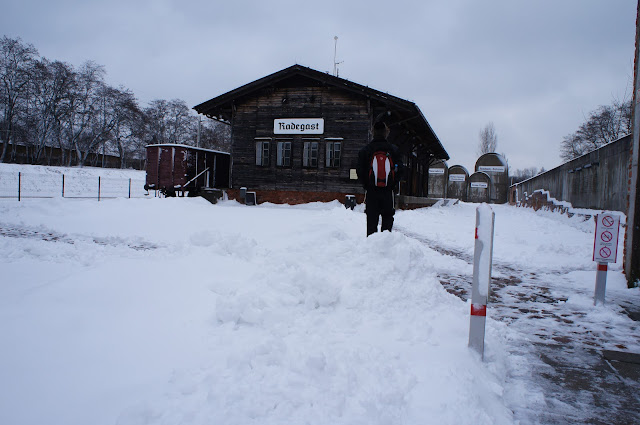JACOB JR, MY JEWISH WORLD. THE RADEGAST STATION. LODZ/POLAND
The Radegast Station, or the loading platform at Marysin Verladebahnhof Getto Radegast Stalowa Street.
Address: Aleja Pamieci Ofiar Litzmannstadt Getto 12. Lódz.
This is one of the most importante historical sites connectedto the Lódz ghetto. From this place, tens of thousands of people were herded offto the death camp at Chelmno-nad-Nerem in the years 1942-1944 and then to Auschwitz in August 1944. The original wooden building along with its loading platform still stands today. The railway station was built in 1937. It took on a particular role in April 11940 once the ghetto was sealed off and isolated from all the rest of Lódz. Soon the station and its immediate surroundings were cordoned off with barbed-wire fencing. People living in the neighboring residential área were forced to move out. A guardhouse, warehouse and additional tracks were built.
Beginning in 1940, food and fuel for the ghetto was shipped in through the Radegast Station, what was commonly callled "the lloading platform in Marysin." The raw materials necessary for the production of clothes, shoes and uniforms for the German military also arrived here. Read-made goods then were transported out of the ghetto ffrom this site. Beginning in mid-1940, the ghetto Jews were escorted fromm the station to labor camps in the Poznan region. They were also led out to construct the rail junction at Lódz-Olechow.
Starting in 1942, transports Jews were sent out from Radegast to their deaths From the spring to the autumn of 1942, more than 70,000 Jews were sent north to the death camp of Chelmno-nad-Nerem. The transports were suspended fora year and a half, then the mass killing at Chelmno resumed. In June and July of 1944, more than 7,000 people were escorted there. Almost no one survived. Beginning on August 2, 1944, the surviving ghetto inhabitants were transported to Auschwitz. The last transport of ghetto Jews is reported to have left on August 29, 1944. Of the more than 70,000 people deported to Auschwitz during those final days, only a few thousand survived. The figures quoted by historians vary and oscillate between 5,000 and 15,000.
The Radegast Station was so-callled Umschlaplatz of Lódz, the site where people were assembled just prior to being shipped out, in most cases to die. This modest station building on Stalowa Street marked those final steps, the final moments in the Litzmannstadt Ghetto.
Shalom! Aleichem.
Cultural Support: Jacob Jr. B.A.C.E., avec L'Integration d'Association avec Israel et dans le Monde/Cz .












Comments
Post a Comment